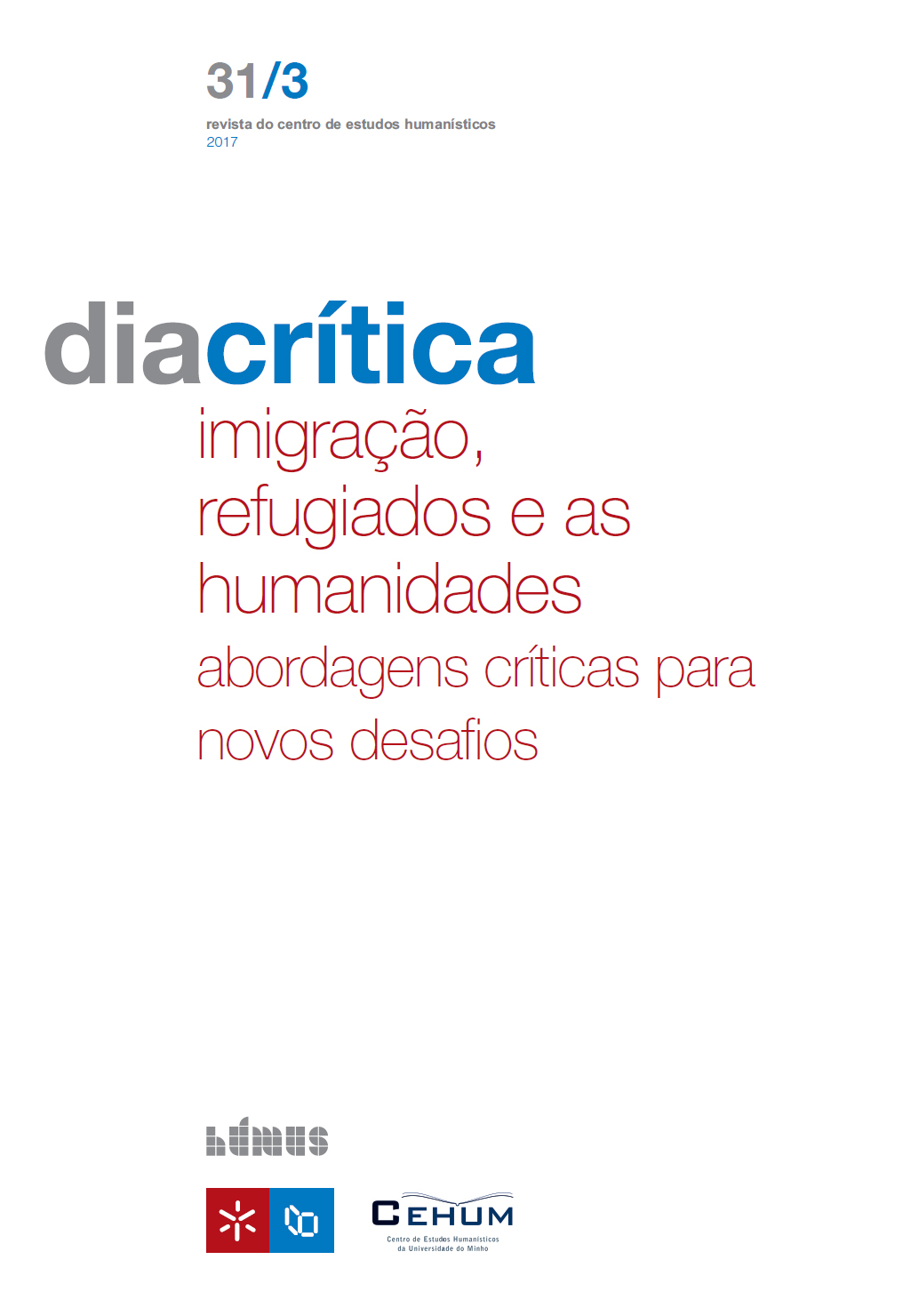LANGUAGE FOR INTEGRATION, LANGUAGE AS DISCIPLINE? A FOUCAULTIAN PERSPECTIVE ON L3 LEARNING IN THE CONTEXT OF ASYLUM
DOI:
https://doi.org/10.21814/diacritica.5173Keywords:
Language, migration, power, asylum, integrationAbstract
Between 2014 and 2016, like in other European countries, a substantial increase of asylum requests took place in Switzerland, which forced the professionals and politi-cians involved in this context to take urgent action. is crisis produced an effect of magnifying glass on power issues linked to language learning, or in other words on language learning as Foucaultian discipline. In this article, I will show that the com-mon link socially constructed between ‘language learning’ and ‘integration’ allows the social actors encountered by asylum seekers to make them learn French as soon as possible for preparation for life in their new country. In doing so, the society sustain-ably disciplines and controls them: asylum seekers, once they reach the status of legiti-mate refugees, are namely concentrated in low-skilled jobs, officially because they lack the necessary language skills for finding a job corresponding to their actual qualifica-tions and desires. Most of them thus live on welfare, a situation that gives arguments to strengthen the current immigration policy and, at the same time, lock them in a refugee identity, that is, of people indebted to a society where they have no other role to play. Meanwhile, this discipline that the State and the host society impose to asylum seekers articulates with social representations of learning the language of the host country, and with the general equivalence that asylum seekers make themselves between learning the host language and integrating the host society. Asylum seekers o#en conceive of L2 learning as a discipline they have to exercise, as they appreciate the language level they should reach to get ‘normalized’ in an apparent linguistically homogeneous society, even if they know that it will never be enough to level social inequalities.
References
Allan, K. (2013). Skilling the Self: e Communicability of Immigrants as FlexibleLabour. In A. Duchêne, M. Moyer & C. Roberts (Eds.). Language, Migration and Social Inequalities: A Critical Sociolinguistic Perspective on Institutions and Work. Bristol / Buffalo / Toronto: Multilingual Matters. DOI: https://doi.org/10.21832/9781783091010-004
Bobrow-Finn, H. (2010). Overcoming barriers: Adult refugee trauma survivors in a learning community. Tesol Quarterly, 44(3), 586-596. DOI: https://doi.org/10.5054/tq.2010.232338
Bourdieu, P. (1981). Décrire et prescrire [Note sur les conditions de possibilité et les limites de l’efficacité politique]. Actes de la recherche en sciences sociales, 38 (La représentation politique 2), 69-73. DOI: https://doi.org/10.3406/arss.1981.2120
Busch, B. (2013). Mehrsprachigkeit. Stuttgart: Facultas Verlag UTB.
Busch, B. (2015). Expanding the Notion of the Linguistic Repertoire: On the Concept of Spracherleben – The Lived Experience of Language. Applied Linguistics, 1-20. DOI: https://doi.org/10.1093/applin/amv030
Caglitutuncigil, T. (2015). Intersectionality in language trajectories: African women in Spain. Applied Linguistics Review, 6 (2), 217-239. DOI: https://doi.org/10.1515/applirev-2015-0011
Castellotti, V.; Huver, E. et al. (2017). Demande institutionnelle et responsabilité des chercheurs: langues, insertions, pluralité des parcours et des perceptions. In J.-C. Beacco, H.-J. Krumm, D. Little et al. (Eds.). L’intégration linguistique des migrants adultes. Les enseignements de la recherche (pp. 425-231). Berlin: De Gruyter Mouton. DOI: https://doi.org/10.1515/9783110477498-058
Duchêne, A. (2017). Sciences sociales et sociolinguistique: disciplines, alternatives, conversations et critiques. Langage & société, 160-161(2), 43-58. DOI: https://doi.org/10.3917/ls.160.0043
Duchêne, A.; Studer, T.; Berthele, R. & Obermayer, S. (2017). Vers un idéalisme lucide et un scepticisme participatif. Babylonia, 1 (2017), 10-11.
Duff, P. A. (2010). Language Socialization into Academic Discourse Communities. Annual Review of Applied Linguistics, 30, 169-192. DOI: https://doi.org/10.1017/S0267190510000048
Foucault, M. (2015). Surveiller et punir. Naissance de la prison (vol. 2). Paris: Gallimard. [1975]
García, O. (2017). Problematizing linguistic integration of migrants: the role of translanguaging and language teachers. In J.-C. Beacco, H.-J. Krumm, D. Little, et al. (Eds.). L’intégration linguistique des migrants adultes. Les enseignements de la recherche (pp. 12-26). Berlin: De Gruyter Mouton. DOI: https://doi.org/10.1515/9783110477498-005
García, O. & Wei, L. (2014). Translanguaging: Language, Bilingualism and Education. Palgrave Macmillan. DOI: https://doi.org/10.1057/9781137385765_4
Gordon, D. M. (2011). Trauma and Second Language Learning Among Laotian Refugees. Journal of Southeast Asian American Education and Advancement, 6, 1-18. DOI: https://doi.org/10.7771/2153-8999.1029
Gumperz, J. J. (1964). Linguistic and Social Interaction in Two Communities. American Anthropologist, 66, 137-153. DOI: https://doi.org/10.1525/aa.1964.66.suppl_3.02a00100
Hymes, D. (1984). Vers la compétence de communication. Paris: Didier.
Kramsch, C. (2005). Post 9/11: Foreign Language between Knowledge and Power. Applied Linguistics, 26(4), 545-567. DOI: https://doi.org/10.1093/applin/ami026
Leudar, I.; Hayes, J.; Nevkapil, J. &Baker, J. T. (2008). Hostility themes in media, community and refugee narratives. Discourse and Society, 19(2), 187-221. DOI: https://doi.org/10.1177/0957926507085952
McDonald, S. (2000). A touch of... class! Trauma and second language learning. The Canadian Modern Language Review / La revue canadienne des langues vivantes, 56(4), 690-696. DOI: https://doi.org/10.3138/cmlr.56.4.690
Maryns, K. (2015). The use of English as ad hoc institutional standard in the Belgian asylum interview. Applied Linguistics, 36(6), 1-23. DOI: https://doi.org/10.1093/applin/amv061
Muehlebach, A. (2012). The Moral Neoliberal: Welfare and Citizenship in Italy. Chicago: The University of Chicago Press. DOI: https://doi.org/10.7208/chicago/9780226545417.001.0001
Pujolar, J. (2007). African women in Catalan language courses: Struggles over class, gender and ethnicity in advanced liberalism. In McElhinny, B. S. (Ed). Words, worlds and material girls: Language, gender and globalization (pp. 305-348), LPSP 19, Berlin: De Gruyter Mouton. DOI: https://doi.org/10.1515/9783110198805.3.305
Scollon, R. (2004). Teaching language and culture as hegemonic practice. The Modern Language Journal, 88(2), 271-274.
Séolis, M., & Thomas, D. (2002). Pour une juste valeur du bénévolat. Nouvelles pratiques sociales, 15(2). DOI: https://doi.org/10.7202/008911ar
Yeung, S. (2016). From cultural distance to skills deficits: 'Expatriates,' 'Migrants' and Swiss integration policy. Multilingua, 1-24. DOI: https://doi.org/10.1515/multi-2015-0074
Zeiter, A.-C. (2013). Reconfigurations identitaires: un passage obligé dans l'appropriation du Français Langue Étrangère ? In O. Galatanu, A.-M. Cozma & V. Marie (Eds.). Sens et signification dans les espaces francophones. La construction discursive du concept de francophonie (pp. 145-158), Vol. Gramm-R 19, Bruxelles: Peter Lang.
Zeiter, A.-C. & Goastellec, G. (2017). Cartographie de l'enseignement-apprentissage du français aux requérants d'asile: des enjeux en tension pour l'individu et la société. Babylonia, 1 (2017), 75-78.
Downloads
Published
How to Cite
Issue
Section
License
Copyright (c) 2023 Anne-Christel Zeiter

This work is licensed under a Creative Commons Attribution-NonCommercial 4.0 International License.










